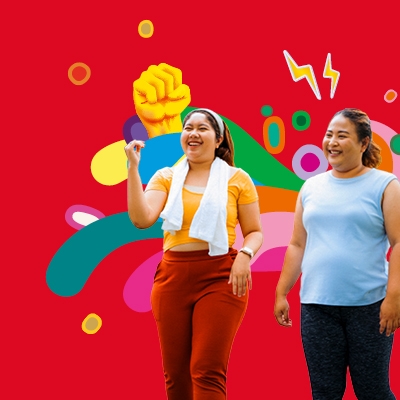-
* Must be 16 years or over to register for Medibank Live Better rewards in the My Medibank app. Some program partners and earning activities require a person to be at least 18 years of age to be eligible to earn and/or redeem a reward. Must be a Medibank member with hospital cover, extras cover, or hospital and extras cover, and be up-to-date with premium payments. Excludes Overseas Student Health Cover (OSHC), Ambulance only cover, ahm covers and other selected covers. Live Better Management Pty Ltd, ACN 003 457 289 has entered into commercial arrangements with Medibank Live Better program partners and may receive commissions. Please choose carefully as rewards will not be amended, cancelled, exchanged or refunded due to change of mind. Points earning activities and rewards are subject to change without prior notice and may be subject to availability. Additional terms and conditions may apply to points earning activities and rewards. See full Medibank Live Better rewards terms.
Apple, the Apple logo, and Apple Pay are trademarks of Apple Inc., registered in the U.S. and other countries and regions. App Store is a service mark of Apple Inc. Google Pay, Google Play and the Google Play logo are trademarks of Google LLC.
What it means to be sober curious

Drinking alcohol has been a social norm in Australia for a long time. A stressful day, a nice dinner, work functions, weddings, funerals, footy games, theatre, book clubs: alcohol is ever present in our lives. Even brunches are boozy now.
Despite this, Madalene rarely drinks. She’s your typical 20-something: often out at restaurants or bars with friends on the weekend, but she generally won’t have a wine or beer in hand.
“I’m part of a fitness community online, which is why I originally gave up drinking. Or only drank very occasionally,” she says.
“I had stints where I was sober for 5 or 6 months, and then I would break it with a drink. But even having that one drink, the effects just outweigh the enjoyment. So after a while, I guess I decided that I just don’t drink.”
She is amongst a growing community of people who are described as sober curious or semi-sober.
What does sober curious mean?
Being sober curious means that you consciously question the role of alcohol in your life, with the intention of drinking less, or not at all. It’s a positive approach that emphasises the benefits of staying sober, including better sleep, better health, time, finances and connection to others.
It’s not necessarily strict abstinence from alcohol, rather a choice to drink more mindfully.
Ruby Warrington’s book Sober Curious brought the term into the popular vernacular, which is now widely used by people to describe their approach to alcohol.
What’s driving the sober curious movement?
CEO of the Australian Psychological Society, Dr Zena Burgess, thinks there are a number of factors driving a more conscious approach to alcohol, particularly among younger generations like Gen Z.
“What we see in the media about alcohol, access to more health information, the influence of social media and the increase in mental health issues are all changing our relationship with alcohol,” she says.
“Our health literacy is changing in so many areas,” says Dr Burgess. “As we understand more about the impact alcohol can have on our health and wellbeing, and how it contributes to other social issues, it’s having an impact on our behaviour.”
“There’s also a large number of people suffering from anxiety and depression, and alcohol use, particularly excessive alcohol use, makes those conditions a whole lot worse.”
The National Drug Strategy Household Survey 2022-23 supports her comments. According to the survey, more than half of those surveyed who had decided to reduce their alcohol consumption listed ‘health’ as one of the reasons. A third listed lifestyle reasons and a quarter listed social reasons.
How to be sober curious
Taking a sober curious approach starts with examining your own relationship with alcohol, says Dr. Burgess. Here are her tips on how to get started.
- Consider when and why you drink. “Think about when you drink. Is it weekends? Is it when your boss yells at you? Is it when the kids stress you out? And then think about what you can do in those situations instead of having a drink,” says Dr Burgess.
- Find an alternative that works for you. “Things like calling a friend, going for a walk, listening to music are all healthy alternatives to deal with stress. Do something that takes away the temptation to reach for a drink,” she says.
- Do it with a buddy: Having someone else can help to keep you accountable, says Dr Burgess. “It’s also great to have the support in social situations when alcohol is around.”
- Reward yourself: Changing your behaviour can be really tough. “Set a reward for yourself for sticking with it, for example, book yourself a massage if you make it through 3 weeks,” says Dr Burgess.
- Seek professional help if you need it: If you’re struggling to change your behaviour, get some help from a psychologist. “Sometimes it’s hard to figure out what triggers you, and you don’t know how to do it differently. Sometimes there is a family history of dealing with stress in a certain way, or a long-established habit and a psychologist can help you work through that,” says Dr Burgess. “It’s also good to get help from someone who knows how to diagnose and treat related conditions like anxiety or depression that may be related to the way you use alcohol.”
The benefits of a sober curious approach
There are many benefits to reducing your alcohol intake. Some of the short-term benefits include better sleep, no hangovers, saving money and clearer skin.
Longer term it can reduce your risk of cancer and many other serious diseases, including cardiovascular disease, obesity, anxiety and depression.
For Madalene, one of the unexpected benefits was realising how alcohol affected her socially.
“It’s actually really changed how I interact with people. I used to be the type of person who would need a drink before I could start talking to people. And I think I had a moment of reflection, and I was like, this is not normal, this shouldn’t happen.”
“I’ve just started a full-time job, and I don’t think that would have happened without having had to build my confidence without alcohol.”
Read more about the benefits of taking a break from alcohol.

Want to save $200 on your premium? Start taking steps today.
Whether it’s carving out time for exercise or trying to squeeze in an extra serve of veg per day, looking after your health and wellbeing takes dedication. That's why eligible Medibank members with hospital and/or extras cover* who have signed up to Live Better rewards could save $200 on their premium by completing everyday healthy actions and redeeming 25,000 Live Better rewards points^.
Things you should know
^ Medibank Live Better Challenges & Goals Earning Policy: The participant of a Medibank Live Better Challenge or Goal may not receive Live Better rewards points or may have their already credited Live Better rewards points reversed in accordance with the Medibank Live Better terms and conditions. To earn Live Better rewards points, the participant needs to properly complete 100% of the eligible Challenge according to the instructions. The number of Live Better points available for Medibank Live Better Challenges and Goals is subject to change without prior notice. The maximum number of Live Better rewards points that each Medibank Live Better member can earn from successfully completing health and wellbeing Challenges, Goals or any Onboarding action in a calendar year is 40,000 Live Better rewards points. To the extent of any inconsistency between this Policy and the Medibank Live Better terms and conditions, the terms and conditions will take precedence.